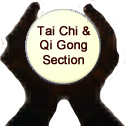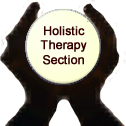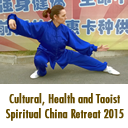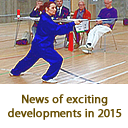What is Qi Gong?
 'Qi Gong' has its roots are in Chinese medicine, philosophy and martial arts. It is sometimes written as chi kung, chi gong, or chi gung. In simplified Chinese it is written 气功; in traditional Chinese: 氣功; and in 'pinyin': qìgōng;
'Qi Gong' has its roots are in Chinese medicine, philosophy and martial arts. It is sometimes written as chi kung, chi gong, or chi gung. In simplified Chinese it is written 气功; in traditional Chinese: 氣功; and in 'pinyin': qìgōng;
A literal translation would be 'Life Energy Cultivation'. It is a practice of aligning body, breath, and mind in order to improve health. It is believed to do this by cultivating and balancing qi (chi) - "life energy". It is a form of meditation, and is used as martial arts training.
Traditional Chinese Medicine
Theories of ancient Chinese Medical Qigong include the Yin-Yang and Five Phases Theory, Essence-Qi-Spirit Theory, Zang-Xiang Theory, and Meridians and Qi-Blood Theory, which have been synthesized as part of Traditional Chinese Medicine. These concepts do not translate readily to modern science and medicine, but practice of qigong has been shown to have beneficial effects and is recommended by many western medicine practicioners as a complimentary therapy.
Qigong focuses on tracing and correcting underlying 'disharmony' in the body. The body needs to be balanced - no deficiency or excess to be healthy. Using the complementary and opposing forces of yin and yang (陰陽), the practicioner aims to create a balanced flow of qi. A person is believed to become ill or die when qi becomes diminished or unbalanced. Health is believed to be returned by rebuilding qi, eliminating qi blockages, and correcting qi imbalances.
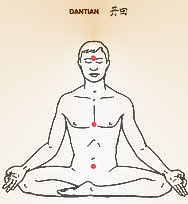 Qi is believed to be cultivated and stored in three main dantian energy centers and to travel through the body along twelve main meridians (Jīng Luò 經絡), with numerous smaller branches and tributaries.
Qi is believed to be cultivated and stored in three main dantian energy centers and to travel through the body along twelve main meridians (Jīng Luò 經絡), with numerous smaller branches and tributaries.
The main meridians correspond to twelve main organs (Zàng fǔ 臟腑)). Qi is balanced in terms of yin and yang in the context of the traditional system of Five Phases (Wu xing 五行).
Qigong in my classes
When I teach Tai Chi I incorporate quigong forms into my classes. They are an excellent means by which the student learns to improve their breathing techniques and to attain a calm mental state. The qigong exercises also improve posture, strength and flexibility and prove to be popular exercise forms with my students.
There are many styles of qigong and each class practices a different set of exercises but most exercises have a particular health effect in mind. One of the first exercises taught is for the relief of stress, anxiety and depression and other qigong sets focus on different aspects of health, for example, muscle and tendons set, immunity strengthening set.
All sets I teach are registered exercises with the Deyin Taijiquan Institute or the British Health Qigong Association.
Click here to find out about the forms of Qigong.
Click here to view some Qigong training videos.

Every tai chi class is opened with a qigong session to prepare the body for practicing tai chi. I also do classes consisting of just qigong.
Please contact me to find out more information about classes.
Click here to find out more about some of the Qigong sets that I teach in my classes

